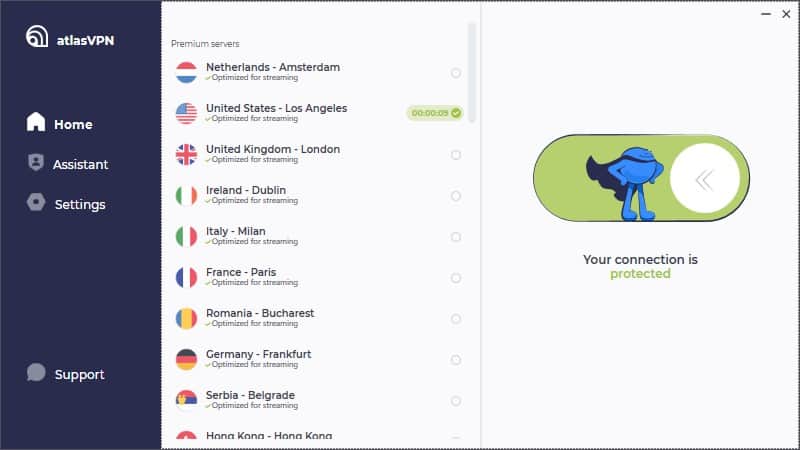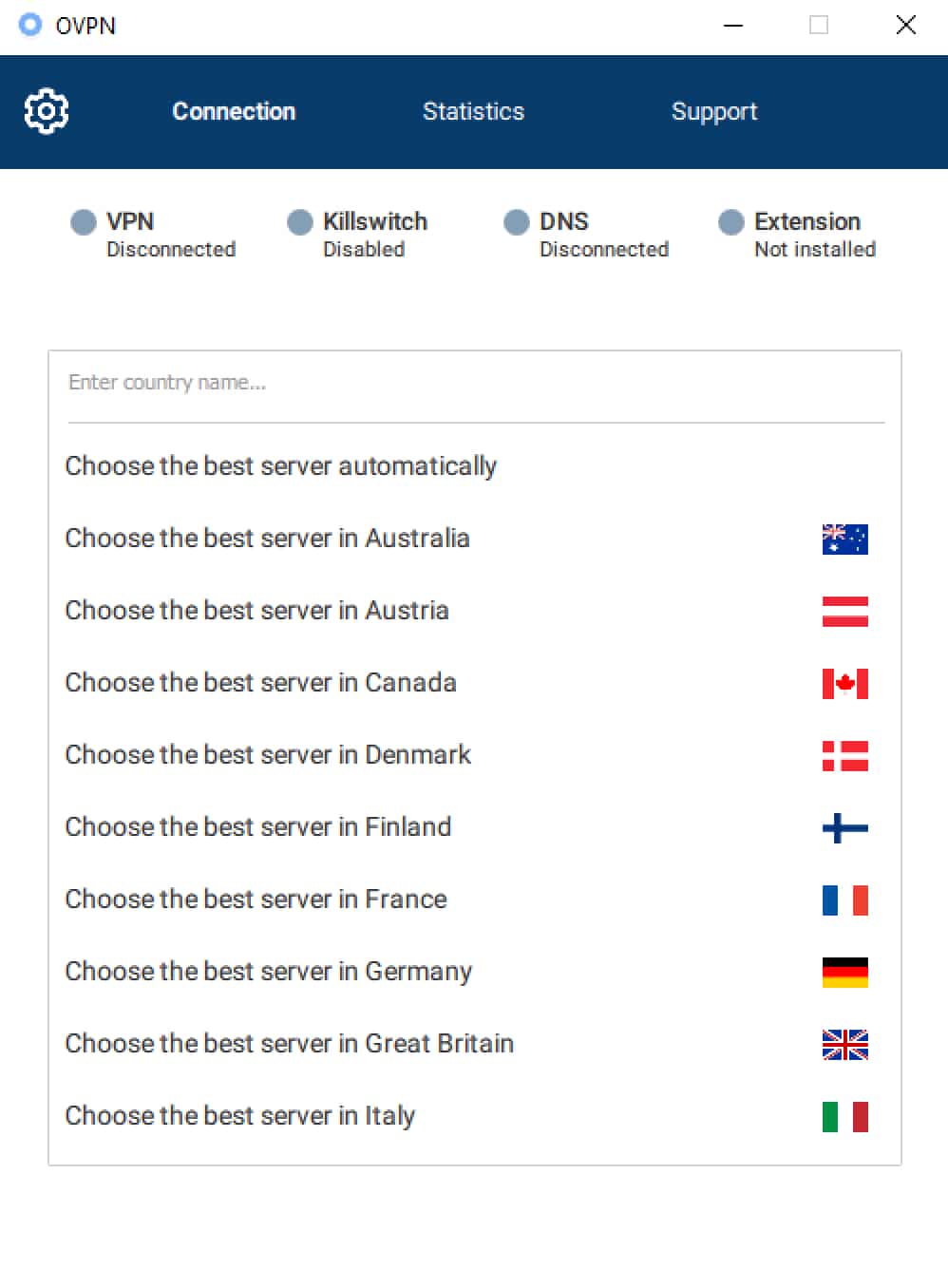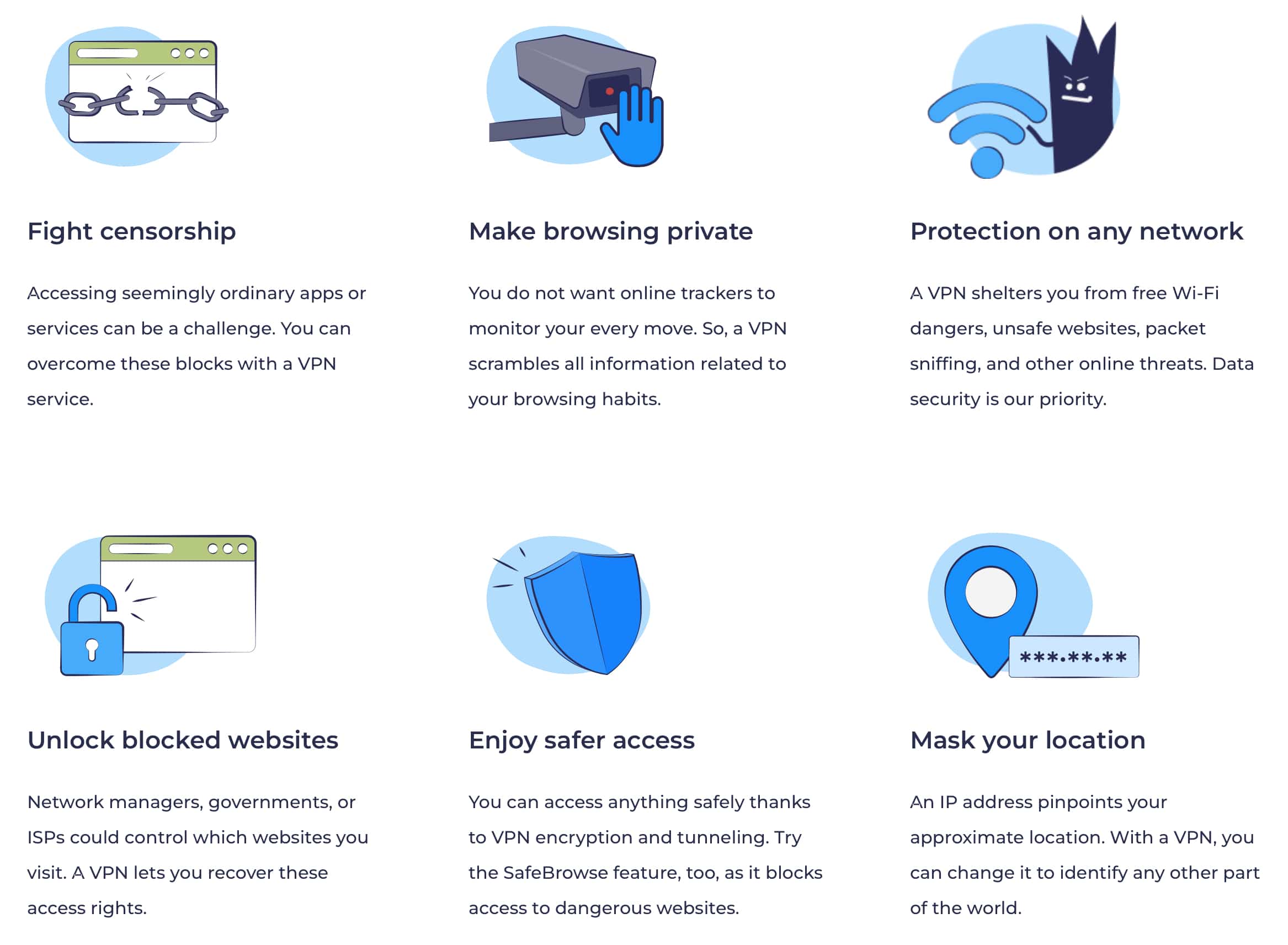Trying to figure out which VPN provider you should sign up for can take more work than it seems. To get all the ins and outs, we need to go beyond marketing, especially when choosing between reputable VPN providers.
That’s this post’s mission: to expose what’s behind the marketing to see what the VPN providers actually offer and determine which one should be recommended. We’re comparing OVPN and AtlasVPN. Let’s see which one comes out on top.
Highlights
OVPN
|
AtlasVPN
|
OVPN VS AtlasVPN pricing
Looking at the prices above, it’s easy to see that AtlasVPN’s prices are lower across the board. So whether you sign-up for a month or a year (or three years), AtlasVPN will be easier on your wallet.
AtlasVPN also provides a better money-back guarantee than OVPN. AtlasVPN offers your standard 30-day money-back guarantee, while OVPN only offers a ten-day refund period. Ten days may well be enough time to test the service and see if it works for you, but it should really align with the industry and offer 30 days.
OVPN VS AtlasVPN features
| OVPN | AtlasVPN | |
|---|---|---|
| Simultaneous connections | 4, 5, or 6 (depending on subscription) | Unlimited |
| Operating system apps | Windows, macOS, Linux, Android, iOS | Windows, macOS, Linux, Android, iOS, AndroidTV, Amazon FireTV |
| Manual install devices | Linux, routers, NAS devices | No |
| Split tunneling | No | Yes |
| Free extras | Browser extension for Chrome, Firefox, and Vivaldi | Tracker Blocker |
Regarding platform support, OVPN has the better offering here. Both providers support the usual suspects (macOS, Windows, iOS, Android). And they both provide a native Linux app, which we don’t see every day. But only OVPN supports routers. It provides online tutorials on how to configure them. And it’s also the only provider of the two to make browser extensions. OVPN has extensions for Firefox, Chrome, and Vivaldi.
Both OVPN and AtlasVPN offer an ad/tracker blocker with their subscriptions.
Only AtlasVPN supports split tunneling. Split tunneling is a popular feature that allows you to determine which apps or URLs are sent through the VPN and which are sent to your ISP gateway. In AtlasVPN’s implementation, split tunneling is app-based, meaning you select which apps are in or out of the VPN, not specific URLs.
The number of simultaneous connections OVPN allows varies by subscription. On its one-month plan, it supports up to four simultaneous connections. On its yearly plan, that number goes up to five connections. And it goes to six on its two-year plan. AtlasVPN, for its part, allows for unlimited simultaneous connections across all its subscriptions – good stuff.
Speed
| Speed | OVPN | AtlasVPN |
|---|---|---|
| North America | 95 Mbps | 260 Mbps |
| Europe | 115 Mbps | 158 Mbps |
| Asia | 100 Mbps | 356 Mbps |
| Global | 103 Mbps | 258 Mbps |
Based on the numbers above, it’s safe to say that AtlasVPN does a better job with speed than OVPN. There’s no real competition here – AtlasVPN takes it. If you have a high-speed internet connection, OVPN may slow you down – not AtlasVPN.
If VPN speed is very important to you, you’ll want to choose AtlasVPN over OVPN.
Streaming capabilities
| OVPN | AtlasVPN | |
|---|---|---|
| Streaming service | ||
| Netflix | US, Germany, Sweden | US, UK |
| Hulu | Yes | Yes |
| Sky Go | No | No |
| Amazon Prime Video | Yes | Yes |
| BBC iPlayer | No | Yes |
| Disney+ | No | Yes |
| ABC | No | No |
| CBS | No | No |
| NBC | No | No |
| ITV Hub | Yes | No |
| HBO Max | No | Yes |
| Channel 4 (All 4) | No | No |
OVPN supports streaming and works with a decent number of services. It worked with Netflix US, Germany, and Sweden. It also worked with Amazon Prime Video, Hulu, and ITV Hub. That is alright, but others (like AtlasVPN) can do much better.
As mentioned above, AtlasVPN’s streaming support is much broader than OVPN’s. It supports many more streaming services than OVPN. And these days, streaming providers are working hard to block VPN users, so AtlasVPN’s support is impressive and welcome.
So, AtlasVPN takes it regarding streaming. But if streaming over VPN is important to you, you should look at our recommended VPN providers for streaming.
China
Neither of these two VPN providers works in China. AtlasVPN has even stated that it has no plans to support users in China in the future. It’s getting increasingly difficult to bypass China’s censorship, and many VPN providers would rather put their resources elsewhere.
Rummage through OVPN’s Support forum, and you’ll end up seeing user posts stating that it works, as well as posts stating the contrary. But OVPN doesn’t explicitly support the feature, so I wouldn’t bet much on it working.
So we have a draw in this category. Have a look at our post listing the best VPN providers that work in China.
Setup and interface
| OVPN | AtlasVPN | |
|---|---|---|
| Automatic setup wizard | Windows, macOS, Linux, Android, iOS | Windows, macOS, Android, iOS, Linux, AndroidTV, Amazon FireTV |
| Main location selection | List-based | List-based |
| Extra settings pages | Yes | Yes |
| Mobile friendly | Yes | Yes |
OVPN and AtlasVPN both provide desktop apps that are well-designed and easy to navigate. OVPN’s app is a bit cramped because its UI is smaller. So you’ll need to go through more pages to configure the app to your liking.
AtlasVPN’s app is straightforward to navigate and understand. The left-side pane allows you to navigate the app. Server selection is list-based or task-based (for streaming). You can select your server by country and city. For streaming, it’s recommended to use one of AtlasVPN’s streaming-optimized servers.
OVPN’s app is a bit more cramped and less intuitive, but it’s still easy enough for most VPN users to understand. Server selection is exclusively list-based. You can search for servers by region and then select one located in a specific city. OVPN’s app can also automatically connect you to the fastest server in your selected region.
Both apps provide a Settings page so users can customize the app to their needs. OVPN exposes more options to its users at the expense of a more complex app. AtlasVPN provides simpler option menus, which makes its app’s settings easier to navigate and less cluttered than OVPN’s Settings pages. Props to OVPN for enabling more customization within its app. It’s just necessary to reach a balance not to alienate greener users. Both approaches have their merits and their downsides – to each their own!

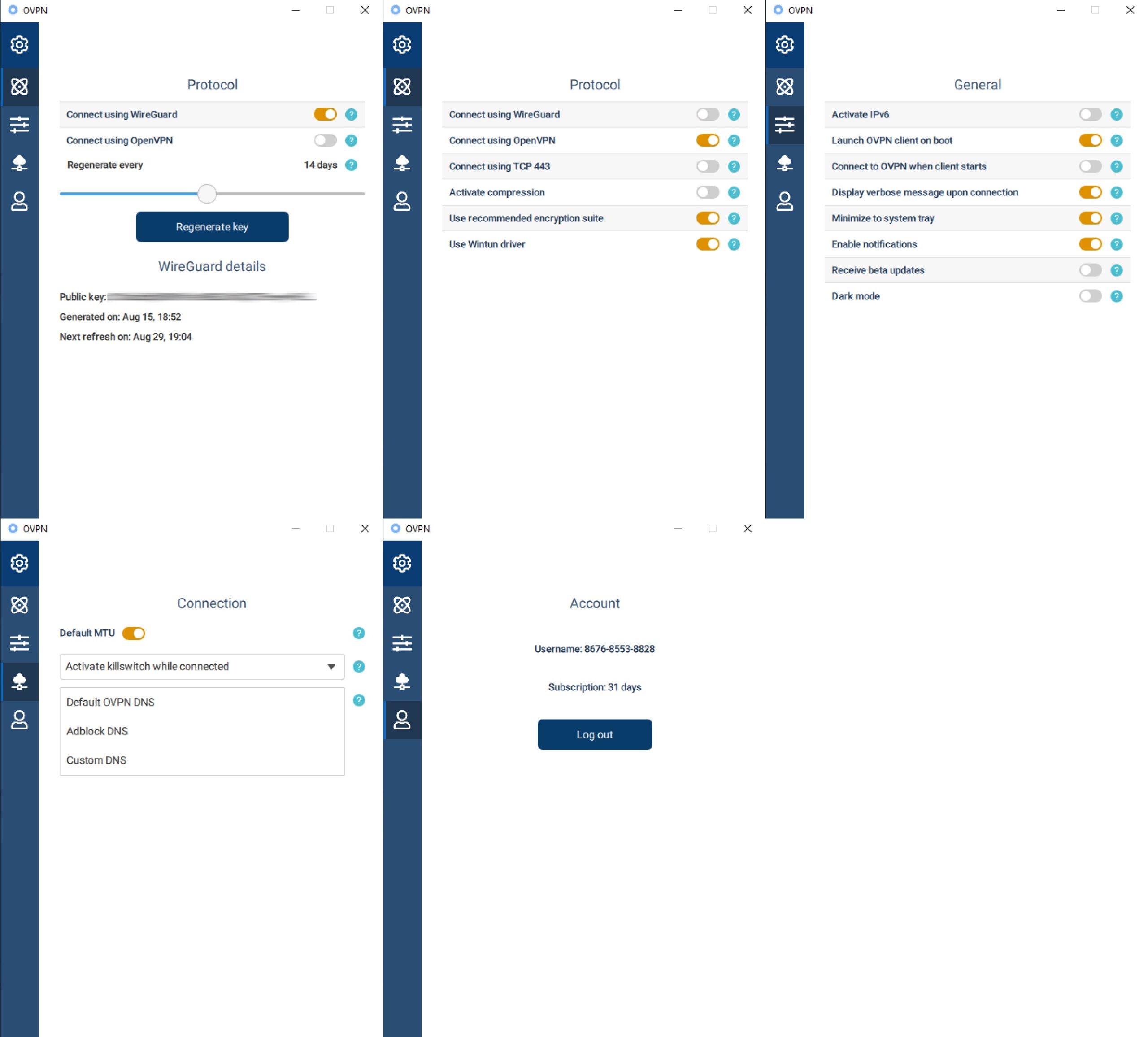
OVPN and Atlas VPN both provide mobile apps that support iOS and Android. They’re both intuitive and adequately designed for smaller screens.
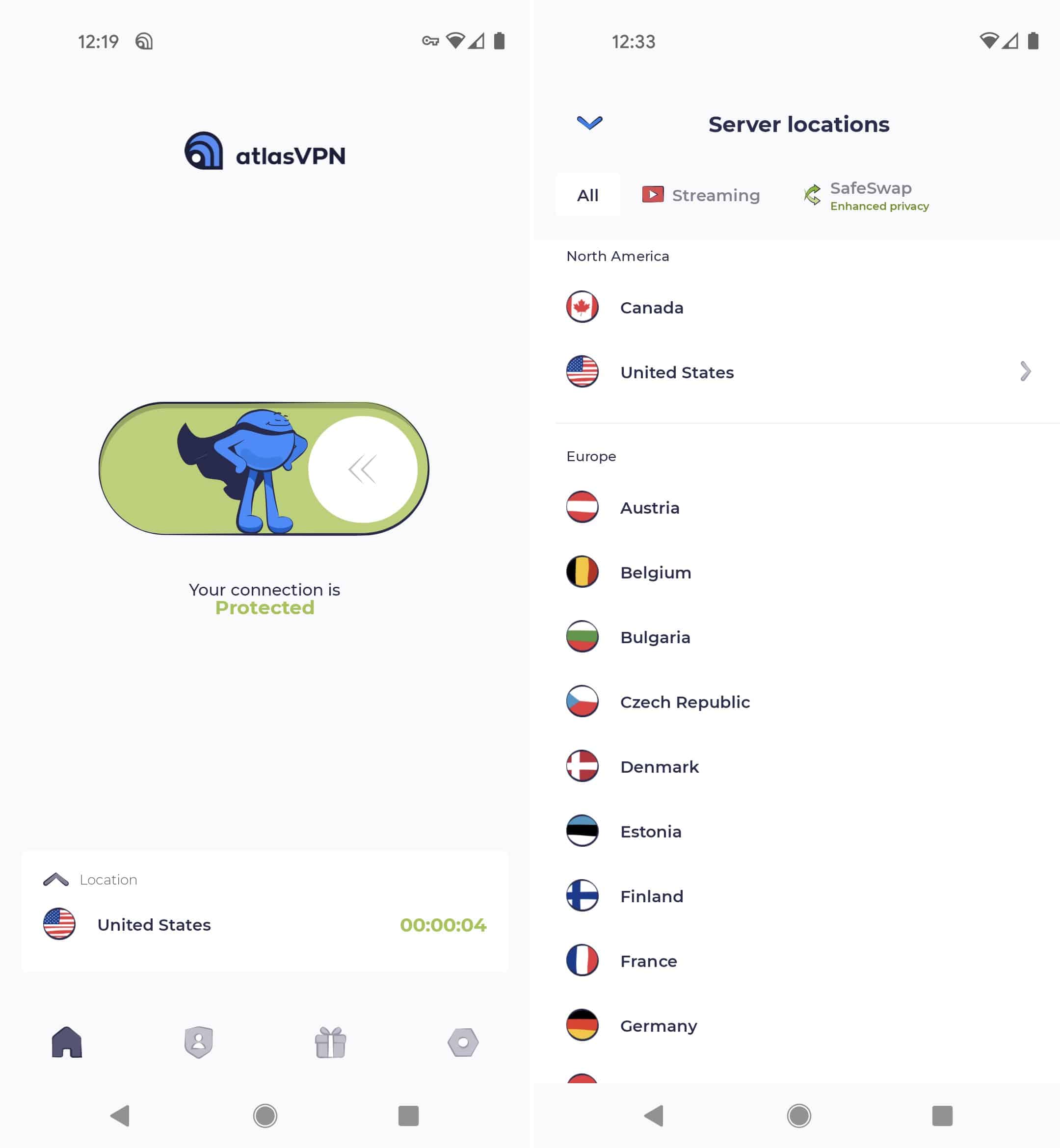
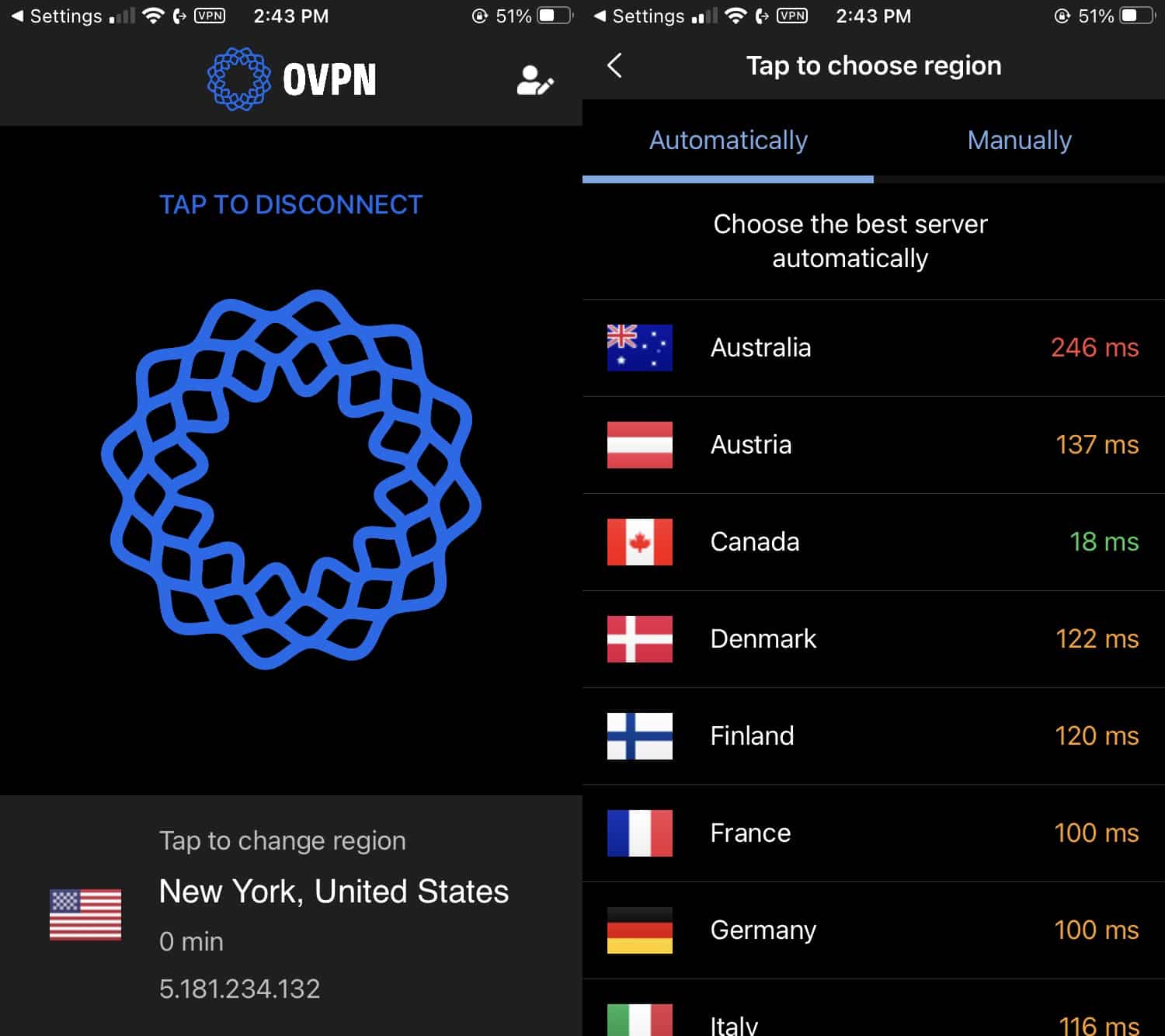
Servers
Both OVPN and AtlasVPN have relatively small networks. Some users prefer smaller networks, while others prefer having a long list to choose from. Despite being small, AtlasVPN’s network is roughly twice the size of OVPN’s network. And that’s both in terms of the number of countries and servers. But it’s still a small network. So if you need an extensive VPN network with many servers and locations, you should perhaps look beyond these two providers.
Below is a list of countries where each provider hosts VPN servers:
| OVPN | AtlasVPN | |
|---|---|---|
| Albania | ✔ | |
| Argentina | ✔ | |
| Australia | ✔ | ✔ |
| Austria | ✔ | ✔ |
| Belgium | ✔ | |
| Brazil | ✔ | |
| Bulgaria | ✔ | |
| Canada | ✔ | ✔ |
| Chile | ✔ | |
| Czech Republic | ✔ | |
| Denmark | ✔ | ✔ |
| Estonia | ✔ | |
| Finland | ✔ | ✔ |
| France | ✔ | ✔ |
| Germany | ✔ | ✔ |
| Hong Kong | ✔ | ✔ |
| Hungary | ✔ | |
| Iceland | ✔ | |
| Italy | ✔ | ✔ |
| Israel | ✔ | |
| Japan | ✔ | ✔ |
| Latvia | ✔ | |
| Mexico | ✔ | |
| Netherlands | ✔ | ✔ |
| New Zealand | ✔ | |
| Norway | ✔ | ✔ |
| Poland | ✔ | ✔ |
| Portugal | ✔ | |
| Romania | ✔ | ✔ |
| Serbia | ✔ | |
| Singapore | ✔ | ✔ |
| Slovakia | ✔ | |
| Slovenia | ✔ | |
| Spain | ✔ | ✔ |
| Sweden | ✔ | ✔ |
| Switzerland | ✔ | ✔ |
| United Arab Emirates | ✔ | |
| United Kingdom | ✔ | ✔ |
| United States | ✔ | ✔ |
Security
| OVPN | AtlasVPN | |
|---|---|---|
| VPN protocols | OpenVPN, WireGuard | WireGuard, IKEv2 |
| OpenVPN data encryption | AES-256 | AES-256 |
| OpenVPN control channel encryption | RSA-4096 | RSA-4096 |
| Cloaking technology | None | None |
| App security | Kill switch | Kill switch |
| DNS status | Private DNS | Private DNS |
Both providers support secure VPN protocols – and both support only two. AtlasVPN supports WireGuard and IKEv2. OVPN supports OpenVPN and WireGuard. All of these VPN protocols are very secure. In fact, IKEv2, OpenVPN, and WireGuard are the three most secure VPN protocols available today. So on the security front, both providers are on the ball regarding protocols.
OVPN and AtlasVPN use 256-bit AES encryption with 4096-bit RSA keys for OpenVPN/IKEv2. WireGuard uses different ciphers that are also deemed highly secure.
Both OVPN and AtlasVPN provide a kill switch in all their apps (mobile and desktop). Both use their own no-logging DNS servers inside the VPN tunnel by default. And OVPN also owns its entire infrastructure, which is a big boon to security as it eliminates the risks that come with third-party handling. So OVPN gets a slight edge in terms of security. Still, both providers have solid security practices.
Privacy
| OVPN | AtlasVPN | |
|---|---|---|
| HQ base | Sweden | United States |
| Connection logs | None | None |
| Activity logs | None | None |
| User details for sign-up | Email address | Email address |
| Anonymous payment options | Bitcoin, Ethereum, Monero | Bitcoin, Ethereum, Ripple |
OVPN is based in Sweden, and AtlasVPN is based in the United States. Sweden is part of the 14 Eyes Alliance, in which the member nations share intelligence. And the United States is the head of the latter organization. So if you use a VPN primarily for privacy, both these jurisdictions might put you off. However, both providers have excellent privacy practices and collect minimal data on their customers. They can’t hand over data they never collected in the first place.
AtlasVPN operates what it calls SafeSwap servers. SafeSwap servers automatically rotate their IP address whenever you navigate to a new website or app. Because the SafeSwap server’s IP address continuously changes, it makes your online activities much harder to track. On top of that, AtlasVPN was acquired by Nord Security (the maker of NordVPN), and its privacy policy will soon be aligned with NordVPN. So things will only get better with AtlasVPN.
OVPN currently has the better privacy policy and also distinguishes itself by the fact that its no-logging claims were tested in 2020. Certain film companies went to court to try and compel OVPN to provide user data after discovering that some of their copyrighted content had been illegally downloaded using an OVPN IP address. The court ruled in favor of OVPN and its no-logging policy. It found no evidence that could contradict the claim that OVPN never collected the requested data and ruled that OVPN could not be compelled to disclose information it didn’t have.
Both providers have excellent privacy practices, but OVPN has a better privacy policy at this time. That, coupled with its willingness to stand up for user privacy in court, give it the edge in this category.
Configuration
| OVPN | AtlasVPN | |
|---|---|---|
| Address allocation | Shared or private (add-on) | Shared |
| Static IP address possible | No | No |
| DDoS protection | No | No |
| Ad & malware blocking | Yes | Yes |
It’s easy to understand why shared IP addresses are better for privacy than dedicated IP addresses. When using a shared IP address, every user of a VPN server is assigned the same IP address – the server’s IP address. So all those users’ traffic looks like it’s coming from the same source (i.e., device). That makes it much harder to correlate traffic to a specific VPN user.
Both OVPN and AtlasVPN assign their users shared IP addresses by default. OVPN can also provide a dedicated IP address as a paid add-on. A private VPN IP address is useful when you want to host servers that should be accessible from the internet but behind the VPN – to benefit from the enhanced security.
Both OVPN and AtlasVPN provide their users with an ad and malware blocker. In both cases, the blocking is achieved through DNS blackholing. The way DNS blackholing works is that whenever you send out a DNS query, your DNS requests get checked against a list of known ad networks and malware domains. Whenever any of those requests match, they get blocked. When they don’t match, the request goes through unhindered. It’s a great feature in my book. And I’d like to see more VPN providers offer this feature.
Customer service
| OVPN | AtlasVPN | |
|---|---|---|
| Live chat | Yes | No |
| Ticket support | No | No |
| Email support | Yes | Yes |
| Average email response time | 12.5 hours | 13 hours |
| Phone support | No | No |
| Searchable knowledge base | Yes | Yes |
| Video guides | No | No |
OVPN and AtlasVPN provide email support and feature a searchable knowledge base on their respective websites. But only OVPN has live chat. It would be nice if AtlasVPN supported live chat in the future, but it’s not a dealbreaker for me.
We wanted to test each provider’s response time with customer service emails. To that end, we sent each provider three questions in three separate emails. The first two questions are very common and shouldn’t be difficult to answer with minimum knowledge. The third question is purposefully more challenging to answer and requires a deeper understanding of VPNs and networking. And the third question asked is different for each provider because they don’t support the same features.
The results are below:
| OVPN | |||
|---|---|---|---|
| Question | Initial response time | Number of emails | Question answered |
| What kind of logs does OVPN keep? | 12 hours | 1 | Yes |
| OVPN on a DD-WRT router? | 12 hours | 1 | Yes |
| What's the difference between the OVPN app and the browser extension? | 14 hours | 1 | Yes |
| AtlasVPN | |||
|---|---|---|---|
| Question | Initial response time | Number of emails | Question answered |
| What kind of logs does AtlasVPN keep? | 13 hours | 1 | Yes |
| AtlasVPN on a DD-WRT router? | 13 hours | 1 | Yes |
| What's the difference between a proxy server and a VPN? | 13 hours | 1 | Yes |
Both providers answered my questions in less than 24 hours. And their answers were polite, accurate, and to the point. They also both asked me if I needed help with anything else in each of their responses. OVPN’s answers were somewhat more detailed, but I felt both providers performed very well in this category. And I was surprised by how good AtlasVPN’s customer service was. When my colleague reviewed AtlasVPN, customer service was one of the provider’s biggest downsides. I’m happy to see an improvement.
The winner: AtlasVPN
Apps Available:
- PC
- Mac
- IOS
- Android
- Linux
- FireTV
Website: www.AtlasVPN.com
Money-back guarantee: 30 DAYS
So AtlasVPN takes it. But these are two excellent VPN providers. OVPN really needs to fix its speed issue – it used to be much faster. While speed isn’t the be-all and end-all of VPNs, it nonetheless becomes difficult to recommend a VPN provider that will slow you down, regardless of how well it performs in other areas.
AtlasVPN also has better streaming support than OVPN and puts no cap on the number of simultaneous connections you can have. It kind of puts OVPN’s convoluted approach to simultaneous connections to shame. AtlasVPN is also cheaper and provides a full 30-day money-back guarantee, compared to OVPN’s ten-day refund period.
So, in a nutshell, here’s what puts AtlasVPN over the edge:
- AtlasVPN is significantly faster than OVPN.
- AtlasVPN allows unlimited simultaneous connections.
- AtlasVPN is cheaper across the board.
- AtlasVPN’s streaming support is excellent.
- While OVPN may well have higher privacy and security standards, AtlasVPN’s security practices are pretty much on par with the industry, and they’re set to align with NordVPN’s excellent standards.
- AtlasVPN only supports secure VPN protocols: IKEv2 and WireGuard.
Again, I could happily sign-up for either provider in this comparative review. It’s just that most VPN users will get more for their dollars with AtlasVPN.
See also:


